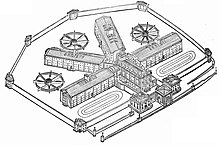
Organised crime

Organized crime is a category of transnational, national, or local groupings of highly centralized enterprises run by criminals who intend to engage in illegal activity, most commonly for profit. Some criminal organizations, such as terrorist groups, are politically motivated. Sometimes criminal organizations force people to do business with them, such as when a gang extorts money from shopkeepers for 'protection'. Gangs may become disciplined enough to be considered organized. A criminal organization or gang can also be referred to as a mafia, mob, ring, or syndicate; the network, subculture and community of criminals may be referred to as the underworld. European sociologists (e.g. Diego Gambetta) define the mafia as a type of organized crime group that specializes in the supply of extra-legal protection and quasi law enforcement. Gambetta's classic work on the Sicilian Mafia generates an economic study of the mafia, which exerts great influence on studies of the Russian Mafia, the Chinese Mafia, Hong Kong Triads and the Japanese Yakuza.If we take a global rather than a strictly domestic view, it becomes evident that even crime of the organized kind has a long if not a necessarily noble heritage. The word 'thug' dates back to early 13th-century India, when Thugs, or gangs of criminals, roamed from town to town, looting and pillaging. Smuggling and drug-trafficking rings are as old as the hills in Asia and Africa, and extant criminal organizations in Italy and Japan trace their histories back several centuries... Organized crime is a category of transnational, national, or local groupings of highly centralized enterprises run by criminals who intend to engage in illegal activity, most commonly for profit. Some criminal organizations, such as terrorist groups, are politically motivated. Sometimes criminal organizations force people to do business with them, such as when a gang extorts money from shopkeepers for 'protection'. Gangs may become disciplined enough to be considered organized. A criminal organization or gang can also be referred to as a mafia, mob, ring, or syndicate; the network, subculture and community of criminals may be referred to as the underworld. European sociologists (e.g. Diego Gambetta) define the mafia as a type of organized crime group that specializes in the supply of extra-legal protection and quasi law enforcement. Gambetta's classic work on the Sicilian Mafia generates an economic study of the mafia, which exerts great influence on studies of the Russian Mafia, the Chinese Mafia, Hong Kong Triads and the Japanese Yakuza. Other organizations—including states, churches, militaries, police forces, and corporations—may sometimes use organized-crime methods to conduct their activities, but their powers derive from their status as formal social institutions. There is a tendency to distinguish organized crime from other forms of crime, such as white-collar crime, financial crimes, political crimes, war crime, state crimes, and treason. This distinction is not always apparent and academics continue to debate the matter. For example, in failed states that can no longer perform basic functions such as education, security, or governance (usually due to fractious violence or to extreme poverty), organized crime, governance and war sometimes complement each other. The term 'Oligarchy' has been used to describe democratic countries whose political, social and economic institutions come under the control of a few families and business oligarchs. In the United States, the Organized Crime Control Act (1970) defines organized crime as 'he unlawful activities of a highly organized, disciplined association '. Criminal activity as a structured process is referred to as racketeering. In the UK, police estimate that organized crime involves up to 38,000 people operating in 6,000 various groups. Due to the escalating violence of Mexico's drug war, a report issued by the United States Department of Justice characterizes the Mexican drug cartels as the 'greatest organized crime threat to the United States'.
